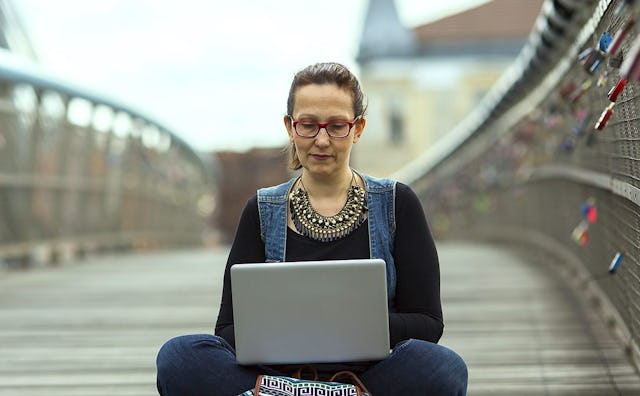5 Ways My 20-Something Sister Has Helped Me Appreciate Being 40

My 23-year-old sister Instagrammed photos of us together at our father’s birthday, and I felt anxiety’s first prickling presence in contrast to my sister’s glowing youth and ridiculous amounts of thick, glossy hair. Beside her, I saw a much older me in the photos (damn that high-definition setting on the iPhone), with pronounced crow’s feet, lackluster collagen, a slightly receding hairline and permanently dark circles that cover-up just doesn’t cover up. While I wouldn’t mind getting my twentysomething body back (not that I appreciated it while I had it), I wouldn’t return to the emotional turmoil of my 20s for anything. Determined not to fall prey to the cultural pressure of obsessing over my looks, I opted to look to the benefits of being 40 that run below the skin:
1. Fewer Surprises
In my 20s, I was often blindsided by jealous girls, bad boyfriends and crappy bosses because I hadn’t yet learned how people operate. California’s drought could be ended if we’d thought to bottle all the tears of surprise I shed over people’s bad behavior. When my sister struggles to understand why a friend or a boyfriend has said or done a particular thing, I pull from experience to reassure her that it’s rarely as bad as it seems, and a lot easier to remedy than she might realize. Experience (and therapy) since then has given me more opportunity to see toxic people coming in time to stave them off. Now, I walk away from emotional pitfalls before I fall in.
2. Not Impressed
My sister is flat out gorgeous. She turns heads when we go out together. She can make a beige shirt look couture on her taut and toned frame. It looks effortless, but I remember the work that goes into such a presentation: In my 20s I spent hours arranging outfits and eye shadow to perfect a look that would attract a mate or impress a colleague. I worried a lot about what people thought of my every word and action, going over gaffes in elaborate, loop-scrawled handwriting in my journal, or on the phone with a friend at night. Now, I only shower every other day and say what I think, even if it changes someone’s opinion of me, because not being myself is way more work.
3. Apology Accepted
In your 20s, it’s easy to see how everyone else has wronged you, and a lot harder to see one’s own part in things. Perhaps the biggest achievement of my 40s is learning to say I’m sorry without a thousand caveats behind it. “I’m sorry but my dog was sick,” or “I’m sorry but you were also a jerk,” just don’t cut it when your intention is to achieve a happy flow of communication. Whether it’s with a client, my husband or my 6-year-old son, I have mastered the art of the excuse-less apology.
4. Sense of Purpose
In my 20s, I only knew that I wanted to be a writer, but I had no idea how to make that more than a hobby. I often felt aimless and oppressed by whatever job I had to pay the bills. I was also always focused on myself: my goals, my needs, my desires. At 40, I am a working writer, and I know who I am well enough that my gaze no longer has to always be down at my own navel—I’m more curious about others, about the culture I live in, the needs of my community, the voices that rarely get heard, and I’m finally in a position to do something about that through my work.
5. Self-Fulfilling Organism
Twentysomethings are restless and needy—in trying to figure out what they want they look to others to find it rather than turning inward. Of course, at twentysomething there’s not as much inward to count on, so you have no choice but to seek wisdom and support in the world and people around you. At 40, I’ve lived through some crises and disasters, some heartbreak and grief, some passion and profound love. If I’m bored, I read, write or watch television. If I’m hungry, I eat food that’s healthy for me, and when I binge on chocolate, I don’t beat myself up over it. I no longer obsessively exercise twice a day, but go to the gym just enough times a week to keep my body feeling healthy. I have cellulite and stretch marks, but they don’t impede my ability to wear clothes or achieve an orgasm. If I’m alone for an hour or a day, I enjoy it rather than feel anxious.
What’s more, research shows that after midlife—be it crisis or creative breakthrough—people become happier, and I’m here to say, I’ve seen the signs.
This article was originally published on